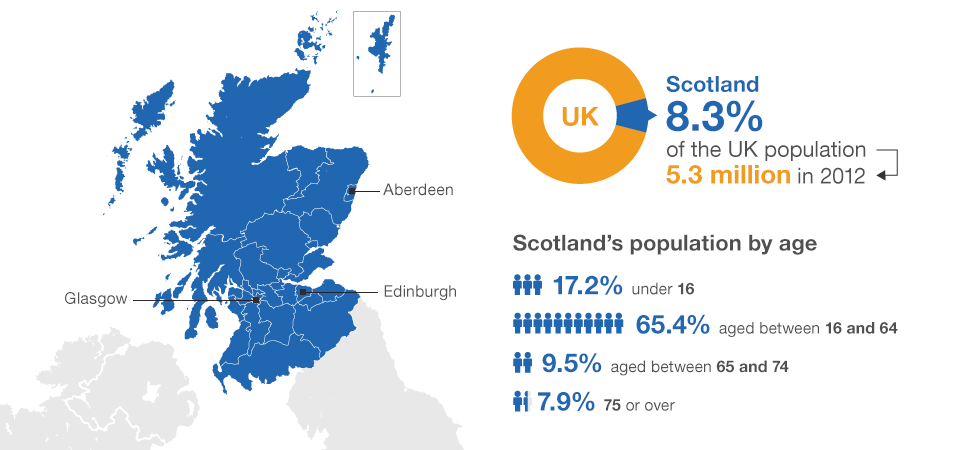The people of Scotland are being asked to consider whether the nation should become independent from the rest of the United Kingdom. But how much do you know about the country? Here we break down some of the key figures.

Scotland is the second largest country in the United Kingdom. Smaller than England but larger in terms of area and population than Wales and Northern Ireland combined. Scotland accounted for 8.3% of the UK population (5.3 million) in 2012. And they are not all mainlanders – around 2% of Scotland’s population live on one of 93 inhabited islands.
National accounts

If oil revenues are included in GDP figures, Scotland is shown to generate more per head of population than the UK as a whole. For Scotland, it is £26,424 per head compared with £22,336 per head for the UK, according to Scottish government estimates.
If you do not include oil and gas revenues then there is little difference in the figures – GDP per head in Scotland was £20,571 in 2011 and for the UK it was £20,873.
Public expenditure per head

Looking at the headline figures, public expenditure per capita in Scotland is higher than the UK average. In 2013, Scotland’s public spending per head was £12,300 and for the UK it was £11,000.
Oil revenues

There are wide-ranging figures on the North Sea gas and oil industry. UK oil revenue has ranged from £1.5bn in 1991-92 to £27bn in 2011-12. It is estimated that 10/20% of Scotland’s tax revenue would be based on oil, whereas that figure is 1.5% in the UK.
Predictions of untapped oil reserves vary greatly, with the Office for National Statistics suggesting that £120bn worth of oil is still to be tapped, and other figures going well above that.
The Scottish government’s oil and gas analytical bulletin of March 2013 estimated that there was £1.5 trillion in wholesale value left in North Sea oil and gas.
Taxes

As a percentage of the UK, Scotland contributes 8.2% in taxes (excluding North Sea oil and gas revenue), which reflects the fact the country accounts for 8.3% of the population. The Government Expenditure and Revenue Scotland (GERS) report, published by the Scottish government, shows a breakdown of the percentage contribution Scots make to the UK tax receipts. Gers figures for 2011-1 say that when a geographical share of North Sea revenue is included, Scotland accounts for 9.9% of UK public sector revenue.
Debt estimates

It is very difficult to say what Scotland’s debt would be. However, GERS has estimated, with a population share, Scotland’s share of debt would be £92 billion which is 62% of estimated GDP, but using an estimated fiscal balance, the debt would be £56 billion, which is 38% of Scotland’s GDP. Many different totals can be calculated using different assumptions
Unemployment

As a percentage of the economically active population, Scotland has 7.5% unemployed; the UK figure is 7.8%.
Weekly pay

A typical weekly (gross) pay packet in Scotland is £498 – less than England but more than in Wales and Northern Ireland.
Household expenditure

The Living Costs and Food Survey shows that, on average, Scots spend less on food than the rest of the UK, but more on alcohol and tobacco.
Health

The latest life expectancy figures suggest that men born in 2010 will live 76 years on average in Scotland, about 60 in a healthy state. Women born in 2010 would expect to live 80 years on average in Scotland, and 64 years being healthy. The life expectancy estimates are lower than for the UK as a whole. Scotland has among the shortest life expectancies in Western Europe.


